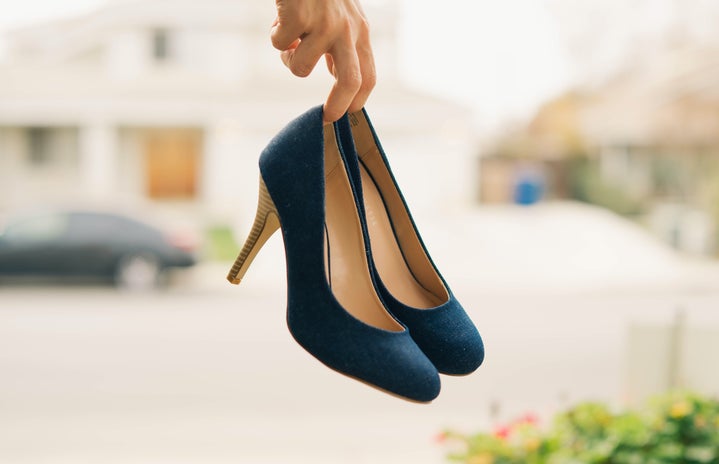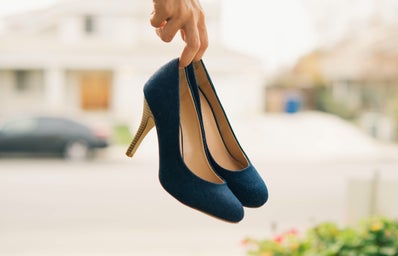I’m at the mall, inside of a trendy store with pictures of smiling girls on the walls and trendy crop tops hanging all around. I go to a rack, sift through the clothing, and nervously pick out a size L, hoping nobody can see the tag of the item I’m picking up.
“Of course she would have to wear a large,” the imaginary voices of the other shoppers echo through my anxious thoughts. I can’t help but feel that everyone is staring at me like I’m the butt of some unsaid joke.
This fear of being noticed for my size follows me whenever and wherever I shop. I’m always filled with anxiety, avoiding the racks where other people are standing so that I don’t feel self-conscious about the clothes I choose. It feels somehow wrong, maybe a little rebellious, that I should dare to be fashionable when I haven’t fit into a single-digit size since I was in grade school. When I go shopping with friends who wear smaller sizes than my own 14-16, the shame I feel when I emerge from the brightly lit dressing room with a pile of clothes that I couldn’t zip or button or that wouldn’t fit over my butt or my thighs or my boobs or my stomach completely overtakes me. Ironically, when I’m in these situations I feel enormously small. Not in a physical sense, but in the sense that all I want to do is shrink away. I feel unrepresented. I’m not like other girls—my body is not meant to be beautiful or look good in the clothes at Forever 21.
But I reject that. It’s no secret that for a long time the fashion industry has preyed upon the unrealistic beauty standards set forth for women and the insecurity they create. The most prevalent of these is arguably the standard that, in order to be beautiful, a woman must be thin. It goes without saying how harmful this mindset is; the perceived need to be thin promotes an unhealthy culture of dieting, body-shaming, and self-hatred, and the fashion industry has done absolutely nothing to combat it. Namely, the production of clothes and trends only accounts for one specific body type, thus leaving the rest of us who don’t fit a highly unrealistic standard feeling insecure and not good enough.
Now, when you walk into a clothing store, it often feels as if every item you try on is a gamble. In some brands, you’re a size 8 but in others you’re a 12. What gives? Every brand has its own sizing chart and guidelines, and without a standard for women’s clothing sizes throughout the industry, it’s can be difficult to feel good about bouncing between bigger and smaller sizes. Additionally, it’s easy to feel as if some stores and brands are deliberately labelling sizes smaller and smaller and limiting the range of sizes they carry. There’s nothing quite like the quiet shame you feel when you have to go up a size or two from your usual number to accommodate for the ridiculous fit from a brand. It’s not just your imagination, and you’re likely not getting much bigger or smaller. This practice, called vanity sizing, is becoming increasingly common among big clothing retailers. In theory, it’s meant to make you feel better about yourself when you’re able to squeeze into a smaller size (because that’s obviously how every person should measure their worth—by the size of their waist), but oftentimes, it just makes us feel worse. Today, what we call a size 8 is comparable to what in 1958 was a size 14. It’s ridiculous. The fashion industry is encouraging women to shrink away to nothingness and to hate every ounce of fat and every roll on their figure.
Moving past vanity sizing, the other elephant in the room of the fashion industry is the existence (and lack thereof) of plus-size fashion. Every time I walk into Forever 21 and peruse the plus-size section after being unlucky with the fit of the “regular” sized clothes, a cloud of anger and irritation comes over me. Why does the plus-size section carry an entirely different line of clothing than can be found in the rest of the store? Isn’t the whole point of “plus-size” to provide a wider range of sizes in the clothes that already exist? Or are fat women just so unworthy of wearing the hottest styles that we’re delegated an entirely different selection? (This idea calls to mind the comments of Mike Jeffries, former CEO of Abercrombie & Fitch who, when confronted about the size exclusivity of his stores, said that, “A lot of people don’t belong [in Abercrombie & Fitch clothes], and they can’t belong.”)
The fashion industry has a track record of making women feel inadequate, and it’s about time that we hold them fully accountable. Obviously, the problem is bigger than just individual manufacturers, but now more than ever, in the age of social media influencers and diet culture, it’s important to fight back. Every person is worth more than the number on the scale. 80% of women in the United States reported being dissatisfied with the way they look. 70% of women who weigh at or around the average weight for women reported that they want to be thinner. This is a problem, and it’s reflected in the way we think and speak about ourselves, the way we dress ourselves, and the ways in which we’re allowed to express ourselves.
We deserve more. We deserve body positivity for all types of bodies. We deserve to wear what we want and to not worry about how others might view us because of that. We are more complex than the plastic mannequins they use to exemplify the “average” woman will ever be. Most importantly, we deserve to love ourselves—and we deserve for that act to be something normal, not revolutionary.
This article is a part of #NEDAwareness Week. Listed below are some resources specifically devoted to support, resources, and treatment for eating disorders:
- Call (800) 931-2237 Monday-Thursday from 8 a.m. to 8 p.m. CT and Friday 8 a.m. to 5 p.m. CT
- Online chat function available on www.myneda.org/helpline
- For a crisis situation, text “NEDA” to 741741 to be connected with a trained volunteer
University Counseling Center at SLU:
- To schedule a counseling appointment, call 314-977-8255
- To schedule an appointment with a psychiatrist, call the Student Health Center at 314-977-2323
- Appointments available 9 a.m. to 5 p.m. Monday through Friday.
Missouri Eating Disorders Association: Treatment Resources Listings

